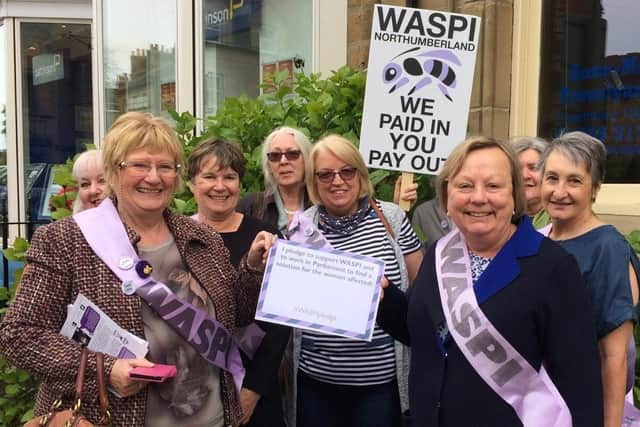Decision by Parliamentary and Health Service Ombudsman to reconsider section of report a 'victory' for WASPI women, says Berwick campaigner
and live on Freeview channel 276
Women Against State Pension Inequality (WASPI) claim the Parliamentary and Health Service Ombudsman (PHSO) ‘failed to follow due process’ in regard to its investigation of the Department for Work and Pensions (DWP) over its failures to communicate changes to the State Pension age.
This saw millions of 1950s-born women affected by a lack of notice in the rise from 60 to 65 (and later 66), plunging tens of thousands into poverty.
Advertisement
Hide AdAdvertisement
Hide AdWASPI co-ordinator Jane Cowley has worked with others across the Berwick-upon-Tweed parliamentary area to raise awareness of the issue and she said there are 6,620 women affected in this constituency.


The campaign launched a process seeking a judicial review in the High Court to challenge the PHSO’s stage two report, raising £120,000 from thousands of affected women, claiming it was ‘flawed’.
And the PHSO has now announced that it will reconsider a section of this report, relating to ‘injustice’, saying that it hopes “this cooperative approach will provide the quickest route to remedy for those affected”.
Jane said: “It’s a testament to the strength of our legal arguments that the PHSO responded to our judicial review in this way.
Advertisement
Hide AdAdvertisement
Hide Ad“This victory is the first step towards getting a better report from the Ombudsman that delivers the fast, fair compensation WASPI has been campaigning for all these years.”
The Ombudsman concluded in 2021 that the DWP was guilty of maladministration in its handling of State Pension age changes.
The stage one report found that 1950s-born women should have had “at least” 28 months’ more individual notice of the changes.
“For women who were not aware of the changes, the opportunity that additional notice would have given them to adjust their retirement plans was lost,” he concluded.
Advertisement
Hide AdAdvertisement
Hide AdHowever, the stage two report – which had been due to be published shortly – had decided to assess the injustice suffered by WASPI women on the premise that each woman affected would have received a letter notifying them of changes to their state retirement ages exactly 28 months earlier than they did.
In the case of the many women who never received a letter, he calculated the 28 months by reference to the dates women in similar circumstances received such letters.
WASPI challenged this approach, arguing that counting 28 months backwards from the dates on which women received letters was ‘irrational’ as it failed to take account of three periods during which the DWP had paused its already belated direct mail campaign and had those affected received letters when they should have, they would have taken different ‘life-changing’ decisions about their work and retirement plans.
A PHSO spokesperson said: “We are confident that we have completed a fair and impartial investigation. As an independent Ombudsman, our duty is to provide the right outcome for all involved and make sure justice is achieved.
Advertisement
Hide AdAdvertisement
Hide Ad“Given the legal challenge brought against us, we have agreed to look again at part of our stage two report. We hope this co-operative approach will provide the quickest route to remedy for those affected and reduce the delay to the publication of our final report.”